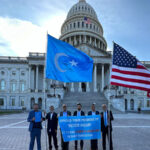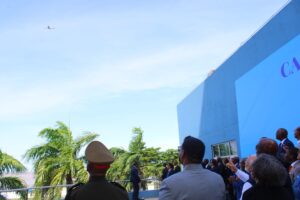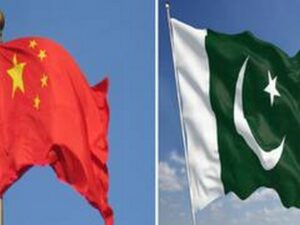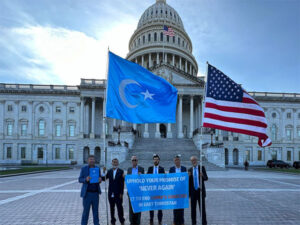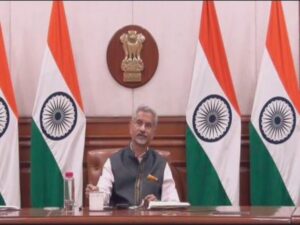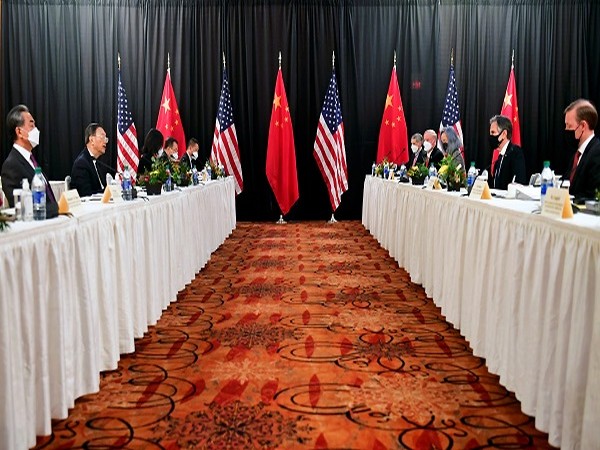
U.S. Secretary of State Antony Blinken (2nd R), joined by National Security Advisor Jake Sullivan (R), speaks while facing Yang Jiechi (2nd L), director of the Central Foreign Affairs Commission Office, and Wang Yi (L), China's State Councilor and Foreign Minister, at the opening session of US-China talks at the Captain Cook Hotel in Anchorage, Alaska, U.S. March 18, 2021. Frederic J. Brown/Pool via REUTERS - RC2YDM940VU4
Beijing [China], June 13 (ANI): Taiwan‘s allies – the US, Japan have been deepening their engagement with the democratic island-nation to help guard it against a growing threat from China, thereby putting Beijing in tight spot.
J Michael Cole, writing in The National Interest said that the regime in Beijing, which continues its effort to isolate Taiwan internationally, is now in the difficult position of having to express its discontent over coronavirus response while avoiding overreaction that could create the rationale for even closer relations between Taiwan and other countries.
Taiwan has had a fairly positive past month in terms of its engagement with, and support by, regional partners.
Beijing’s setbacks began back in April, with the joint statement between US President Joe Biden and his Japanese counterpart, Prime Minister Yoshihide Suga, which “underscore[d] the importance of peace and stability across the Taiwan Strait and encourage the peaceful resolution of cross-Strait issues.”
Such direct reference to Taiwan by a Japanese prime minister had not been heard for more than half a century, reported The National Interest.
This was followed the next month by a similar statement, this one by President Biden and South Korean President Moon Jae-in, which again “emphasize[d] the importance of preserving peace and stability in the Taiwan Strait.”
The unprecedented reference to Taiwan by a South Korean leader also signalled those countries within the region were becoming increasingly alarmed with China‘s destabilizing behaviour–particularly the high number of intrusions by aircraft from the People’s Liberation Army Air Force and Navy into Taiwan‘s southern Air Defense Identification Zone (ADIZ), wrote Cole.
Four days before the Biden-Suga joint statement, a total of twenty-five PLA aircraft–14 J-16 multi-role fighters, four J-10 multi-role fighters, four H-6K bombers, 2 Y-8 anti-submarine planes, and one KJ-500 airborne early warning and control plane–entered Taiwan‘s ADIZ, a new high since the PLA began intensifying its military activity in the region in 2020, reported The National Interest.
But now, China is in a tight spot as Taiwan is receiving more attention from allies. One strategic mistake Beijing may have committed earlier this year was its refusal to reduce its military activity around the Taiwan Strait during the transition period in Washington, wrote Cole.
Whether due to hubris or a failure to understand the fact that the incoming Biden administration would likely continue, and in some cases expand upon, the Trump administration’s policies toward Taiwan, China‘s military assertiveness created the incentives for continued support for Taiwan and the maintenance of US military patrols in the area.
Beijing’s persistent efforts to interfere with Taiwan‘s coronavirus response, which included the alleged sabotaging of Taipei’s negotiations with German vaccine manufacturer BioNTech in August 2020, and renewed campaign to ensure Taiwan‘s exclusion from the WHO’s World Health Assembly in May, underscored, perhaps like never before, that the CCP prioritizes politics over the lives of the so-called “Taiwanese compatriots.”
The growing threat from the Peoples Liberation Army (PLA), added to Beijing’s animus toward Taiwan in times of a global health emergency, created the perfect storm for more recent developments that have greatly benefited Taiwan and caused consternation in China, wrote Cole.
On June 4, the Japanese government delivered 1.24 million doses of the AstraZeneca vaccine to Taiwan, which has encountered difficulties in procuring vaccines amid a global shortage.
The donation followed repeated warnings by Beijing, which regarded the move as political manoeuvrings by “Taiwan separatists” and insists that its own vaccine should be distributed in Taiwan.
China‘s efforts not only failed, but Tokyo, usually cautious about needless angering Beijing, did nothing to avoid offending China by delivering the vaccines on the day marking the anniversary of the Tiananmen Square Massacre in 1989 (Tokyo maintains that this was purely coincidental).
The same day, the US government announced that Taiwan would be among the countries included in the first tranche of the approximately 80 million doses the US will distribute worldwide.
Later that week, following bilateral talks, the defense and foreign ministers of Japan and Australia issued a 2+2 statement in which they “underscore[d] the importance of peace and stability across the Taiwan Strait and encourage the peaceful resolution of cross-strait issues.”
Lawmakers from Japan‘s ruling Liberal Democratic Party, meanwhile, were also calling on the government to strengthen ties with Taiwan and prepare for various contingencies in the Taiwan Strait.
With these developments, the very foundations of Beijing’s efforts to isolate Taiwan seemed to be collapsing. No doubt with some encouragement by the Biden administration, countries that hitherto had been reluctant to mention Taiwan in their official statements were now doing so; what’s worse, such departures from longstanding policy seemed to suggest that the Biden administration’s commitment to a renewed multilateral posture in the Indo Pacific was bearing fruit, and that Taiwan was, if not at the very center of it, then at least one of its components, reported The National Interest.
These recent developments are largely attributable to Beijing’s behaviour since 2020, assertiveness that has fuelled apprehensions within the region while underscoring the necessity of embracing Taiwan so as to deter possible escalation by China. (ANI)




